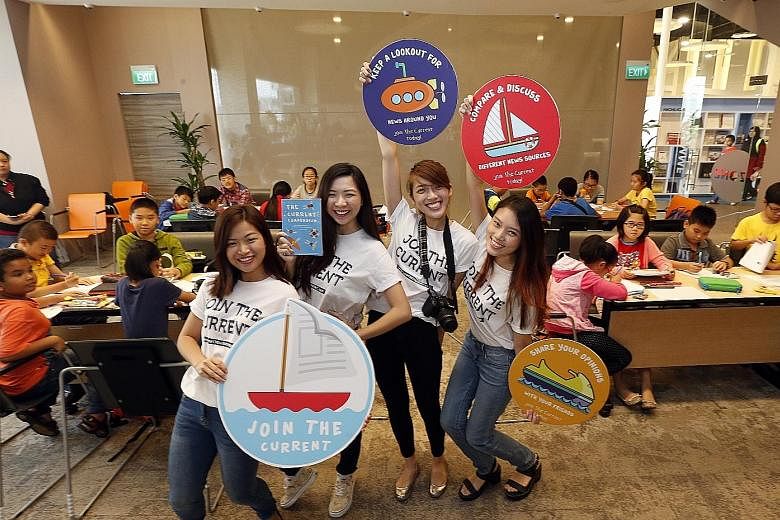Secondary school student Yeat Xin Yi thought robots replacing humans in jobs happened only in fiction. She enjoyed watching science fiction movies, but did not think much about them.
At a recent workshop at Pasir Ris Public Library, however, she learnt that the issues in movies, such as changes to jobs due to the introduction of technology, are happening around her.
"I have never thought that movies have current affairs information in them," the 13-year-old from Hougang Secondary School said.
Xin Yi is one of about 100 underprivileged students from the Chinese Development Assistance Council, Jamiyah Children's Home, and Students Care Service who have benefited from a news literacy campaign organised by four students from Nanyang Technological University (NTU).
It aims to get children interested in current affairs and to sharpen their Internet literacy skills.
"Children from lower-income families are the ones with the least access to resources, such as a newspaper or even a computer at home," said Ms Miranda Yeo, 22, one of the team members.
"We wanted to do our part for the community and reach out to these students who needed to build their literacy skills the most," she added.
The team, from the Wee Kim Wee School of Communication and Information, partnered the National Library Board to run four outreach workshops in libraries here.
The last workshop was held on Sunday at the Central Public Library in Victoria Street. It included interactive games, such as a quiz in which the children had to distinguish between fact and opinion from statements in news articles, especially those on the Internet.
In a survey of about 300 children aged 10 to 14 conducted last November to January, the NTU team found that over 70 per cent of youngsters polled rarely keep up with the news in any media. About a third of them are not curious about world events.
The top reason cited was a lack of interest, with 80 per cent of them saying so. Other reasons included a lack of time or not knowing where and how to get the information.
Ms Yeo said: "Our world is changing rapidly and our generation will have to deal with issues such as global warming, ageing population and terror threats.
"Our ability to do that has to start with us being curious first, to learn about why things are the way they are, before we can come up with the right answers, if any."
The team produced a 24- page current affairs handbook on issues such as food insecurity - explained through colourful infographics.
The NTU team has distributed copies of the handbook to about 500 students at their roadshows in schools. Some schools have expressed interest in introducing the handbook as part of their National Education curriculum, said Ms Yeo.
Xin Yi said: "I am more interested in news now. I learnt more about things that happen around us that I didn't know before, and how to find reliable news sources."

